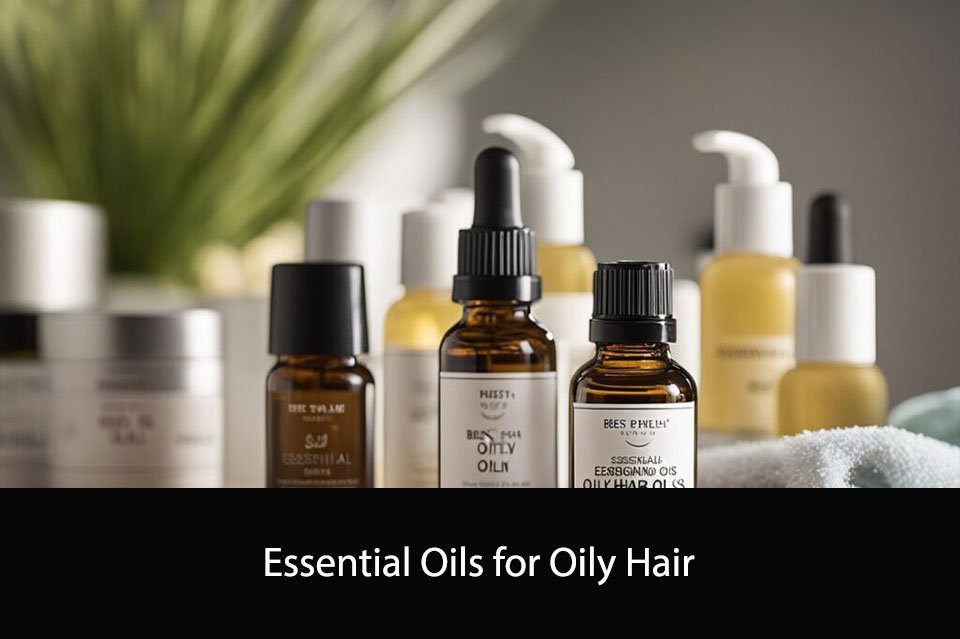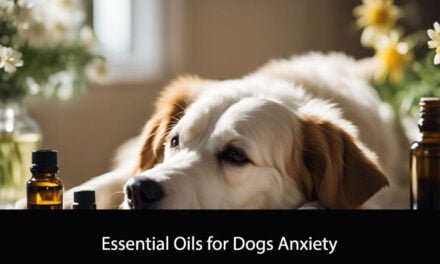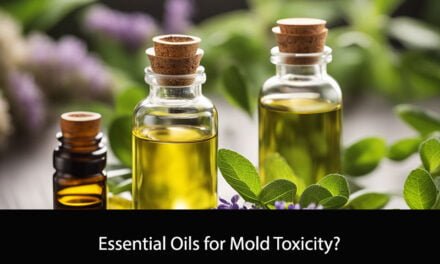Essential oils have been used for centuries for their therapeutic properties. They are highly concentrated plant extracts that can be used for a variety of purposes, including hair care. Oily hair can be a frustrating problem for many people, but essential oils can help.
When it comes to oily hair, the scalp produces an excessive amount of sebum, which can lead to greasy and limp hair. Essential oils can help to regulate the production of sebum, while also providing other benefits such as improving scalp health and promoting hair growth. In this article, we will explore some of the best essential oils for oily hair and how to use them effectively.
Understanding Oily Hair
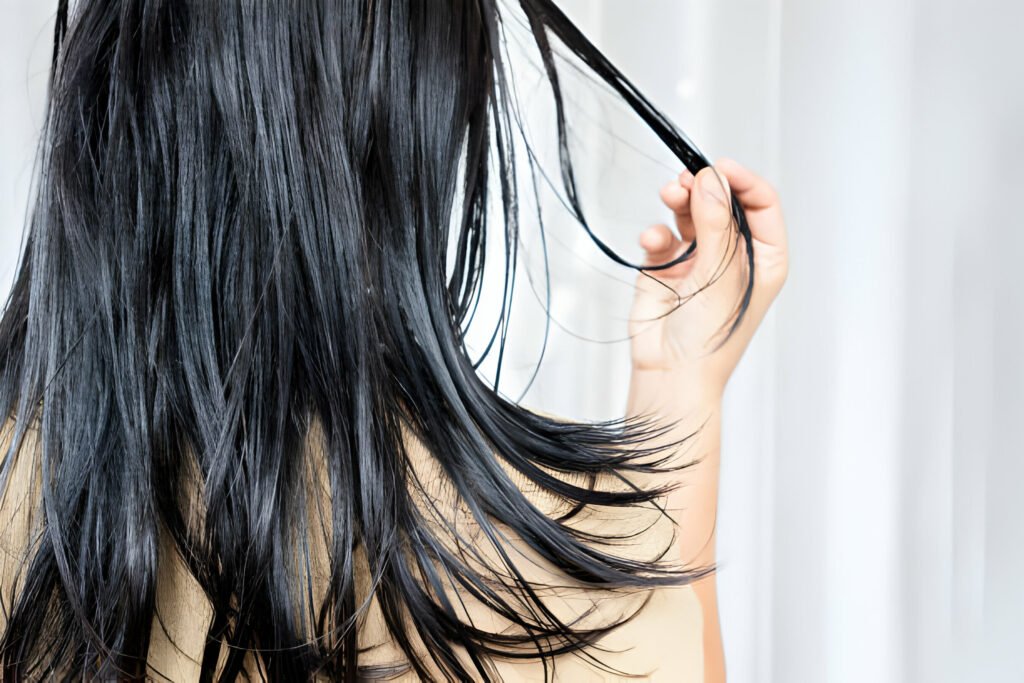
When our hair produces too much sebum, it can become oily and greasy. Sebum is a natural oil produced by the sebaceous glands in our scalp. It is essential for keeping our hair and scalp healthy, but too much of it can lead to oily hair.
There are several factors that can contribute to excessive sebum production, including genetics, hormonal imbalances, and environmental factors. People with oily hair may also experience other scalp issues, such as dandruff and itching.
To manage oily hair, it’s important to understand the causes and take steps to control sebum production. This can include using products specifically designed for oily hair, washing hair regularly with a gentle shampoo, and avoiding harsh chemicals and heat styling tools.
In addition to these measures, essential oils can also be beneficial for oily hair. Some oils, such as tea tree and peppermint, have natural astringent properties that can help to reduce sebum production and keep the scalp healthy. Other oils, such as lavender and rosemary, can help to soothe and nourish the scalp, promoting healthy hair growth.
When using essential oils for oily hair, it’s important to dilute them properly and use them in moderation. Essential oils are highly concentrated and can cause irritation if used in excess. It’s also important to choose high-quality oils from reputable sources to ensure their purity and effectiveness.
Overall, understanding the causes of oily hair and taking steps to manage it can help to promote healthy, beautiful hair. Incorporating essential oils into your hair care routine can be a natural and effective way to keep your scalp and hair healthy and balanced.
Benefits of Essential Oils for Oily Hair
Essential oils are a natural and effective way to manage oily hair. They can help to balance the scalp’s natural oils, reduce excess sebum production, and improve the overall health of your hair. Here are some of the benefits of using essential oils for oily hair:
1. Regulates Sebum Production
Essential oils such as lavender, rosemary, and tea tree oil can help to regulate sebum production. These oils have natural astringent properties that help to reduce oiliness and keep your scalp clean and healthy. When used regularly, they can help to prevent excess oil production and keep your hair looking fresh and clean.
2. Soothes Scalp Irritation
Oily hair can often lead to scalp irritation and inflammation. Essential oils such as peppermint and eucalyptus have anti-inflammatory properties that can help to soothe and calm the scalp. They can also help to reduce itching and flakiness, leaving your scalp feeling healthy and refreshed.
3. Promotes Hair Growth
Essential oils can also help to promote hair growth by stimulating the hair follicles. Oils such as rosemary and cedarwood have been shown to improve circulation to the scalp, which can help to nourish the hair follicles and promote healthy hair growth. They can also help to strengthen the hair shaft, reducing breakage and promoting thicker, healthier hair.
In conclusion, essential oils are a natural and effective way to manage oily hair. They can help to regulate sebum production, soothe scalp irritation, and promote healthy hair growth. By incorporating essential oils into your hair care routine, you can achieve healthy, beautiful hair without the use of harsh chemicals or synthetic ingredients.
Best Essential Oils for Oily Hair
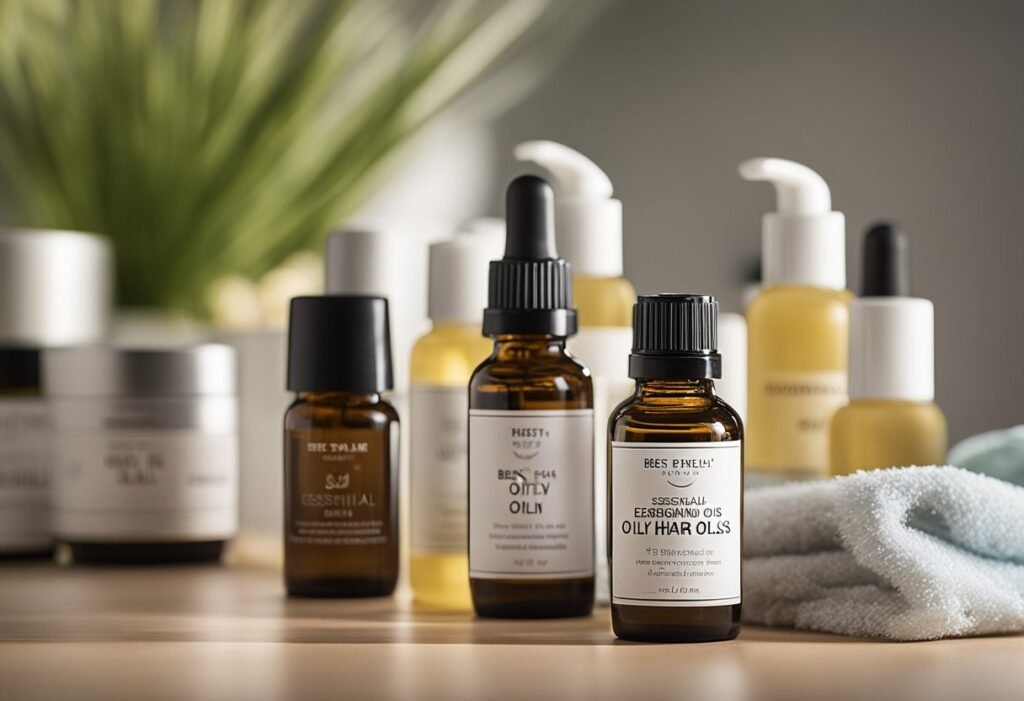
When it comes to managing oily hair, essential oils can be a game-changer. Here are some of the best essential oils for oily hair that we recommend:
Tea Tree Oil
Tea tree oil is well-known for its antibacterial and antifungal properties, making it a great choice for those with oily hair. It can help regulate sebum production, unclog hair follicles, and soothe an itchy scalp. To use, add a few drops of tea tree oil to your shampoo or mix it with a carrier oil and massage it into your scalp.
Lavender Oil
Lavender oil is not only great for relaxation, but it’s also a good choice for those with oily hair. It has antibacterial and antifungal properties that can help keep your scalp healthy and clean. Lavender oil can also help balance sebum production and soothe inflammation. Add a few drops of lavender oil to your shampoo or mix it with a carrier oil and apply it to your scalp.
Rosemary Oil
Rosemary oil is a popular choice for those with oily hair because it can help regulate sebum production and improve scalp circulation. It also has antimicrobial properties that can help keep your scalp healthy. Add a few drops of rosemary oil to your shampoo or mix it with a carrier oil and massage it into your scalp.
Peppermint Oil
Peppermint oil has a cooling effect that can help soothe an itchy scalp. It also has antimicrobial properties that can help keep your scalp healthy. Peppermint oil can help regulate sebum production and improve scalp circulation. Add a few drops of peppermint oil to your shampoo or mix it with a carrier oil and apply it to your scalp.
Lemongrass Oil
Lemongrass oil can help regulate sebum production, making it a good choice for those with oily hair. It also has antimicrobial properties that can help keep your scalp healthy. Lemongrass oil can help soothe an itchy scalp and improve scalp circulation. Add a few drops of lemongrass oil to your shampoo or mix it with a carrier oil and massage it into your scalp.
Overall, essential oils can be a great addition to your hair care routine if you have oily hair. However, it’s important to use them properly and in moderation. Always dilute essential oils with a carrier oil before applying them to your scalp, and be sure to patch test before using them for the first time.
How to Use Essential Oils
When it comes to using essential oils for oily hair, there are several ways to incorporate them into your hair care routine. Here are some effective methods:
Direct Application
One way to use essential oils is to apply them directly to your scalp. To do this, you can add a few drops of your chosen essential oil to a carrier oil, such as coconut or jojoba oil, and massage it into your scalp. This can help to balance your scalp’s natural oil production and reduce excess oiliness.
Shampoo Enhancement
Another way to use essential oils is to add them to your shampoo. You can do this by adding a few drops of essential oil to your regular shampoo and mixing it well before use. Some essential oils that are beneficial for oily hair include tea tree, lavender, and peppermint oil.
DIY Hair Masks
You can also create your own hair masks using essential oils. To do this, mix a few drops of your chosen essential oil with a carrier oil, such as olive or avocado oil, and apply it to your hair. Leave the mask on for 30 minutes to an hour before washing it out with shampoo. This can help to nourish your hair and reduce oiliness.
Precautions and Dilution
It’s important to note that essential oils are highly concentrated and should be used with caution. Always dilute essential oils with a carrier oil before applying them to your scalp or hair. Additionally, some essential oils may cause skin irritation or allergic reactions, so it’s important to do a patch test before using them on your scalp. If you experience any adverse reactions, discontinue use immediately.
In conclusion, essential oils can be a helpful addition to your hair care routine if you have oily hair. By using them in the ways outlined above and taking precautions to ensure their safe use, you can enjoy the benefits of these natural remedies for healthy, balanced hair.
Essential Oil Recipes for Oily Hair
If you’re struggling with oily hair, essential oils can be a natural and effective solution. Here are some easy recipes that can help balance your scalp and keep your hair looking fresh and healthy.
Clarifying Scalp Treatment
Ingredients:
- 2 drops tea tree essential oil
- 2 drops peppermint essential oil
- 2 tablespoons apple cider vinegar
- 1 cup water
Directions:
- Mix the essential oils, apple cider vinegar, and water in a spray bottle.
- Shake well before use.
- Spray the mixture onto your scalp and massage gently.
- Leave the treatment on for 5-10 minutes.
- Rinse thoroughly with water.
Tea tree and peppermint essential oils have natural antibacterial properties that can help cleanse and clarify your scalp. Apple cider vinegar is known for its ability to restore the pH balance of your scalp and hair, which can help regulate oil production.
Oil Balancing Hair Rinse
Ingredients:
- 3 drops lavender essential oil
- 2 drops rosemary essential oil
- 1 tablespoon lemon juice
- 1 cup water
Directions:
- Mix the essential oils, lemon juice, and water in a bowl.
- After shampooing, pour the mixture onto your hair and massage gently.
- Leave the rinse on for a few minutes.
- Rinse thoroughly with water.
Lavender and rosemary essential oils can help regulate oil production and soothe your scalp. Lemon juice is a natural astringent that can help remove excess oil and leave your hair feeling fresh and clean.
Revitalizing Hair Spray
Ingredients:
- 3 drops grapefruit essential oil
- 2 drops bergamot essential oil
- 1/2 cup water
- 1/2 cup witch hazel
Directions:
- Mix the essential oils, water, and witch hazel in a spray bottle.
- Shake well before use.
- Spray the mixture onto your hair and scalp, focusing on the roots.
- Style your hair as usual.
Grapefruit and bergamot essential oils can help refresh and revitalize your hair without weighing it down. Witch hazel is a natural astringent that can help remove excess oil and dirt from your scalp.
We hope these essential oil recipes help you achieve a healthy and balanced scalp!
Lifestyle Tips for Managing Oily Hair
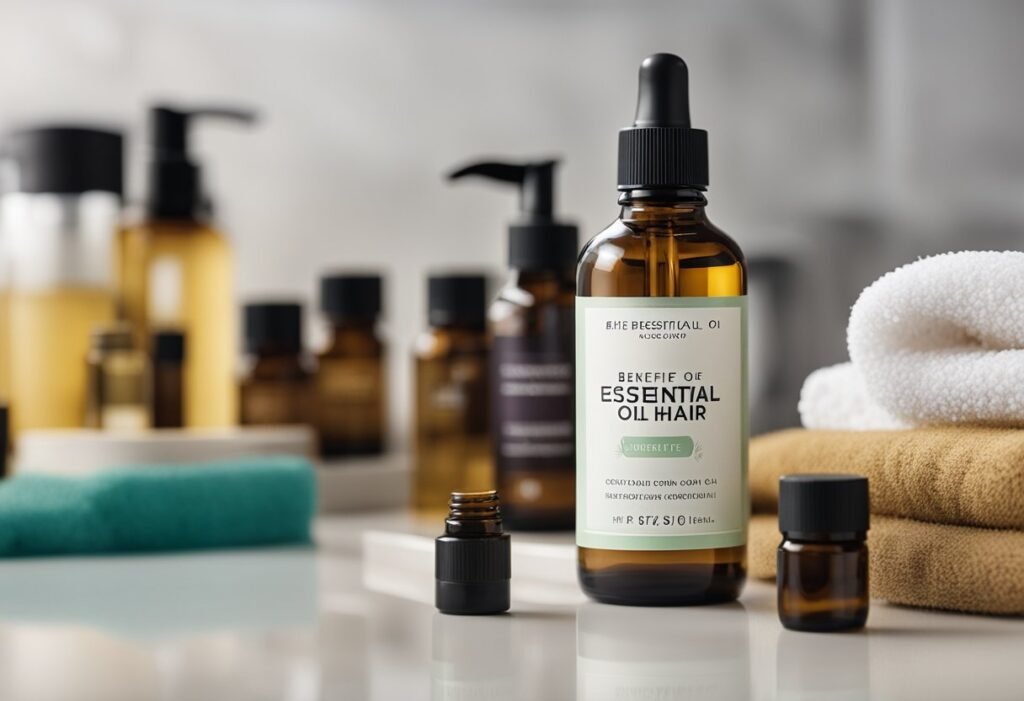
When it comes to managing oily hair, there are a few lifestyle changes that can make a big difference. Here are some tips to help keep your hair looking fresh and clean:
- Wash your hair regularly: Washing your hair every other day or every two days can help control oil buildup on your scalp. Use a gentle, sulfate-free shampoo and focus on the roots of your hair, where oil tends to accumulate.
- Avoid over-brushing: Brushing your hair too often can stimulate oil production on your scalp. Instead, try brushing your hair once a day with a boar bristle brush to distribute oils evenly through your hair.
- Use dry shampoo: Dry shampoo can help absorb excess oil on your scalp and hair. Apply it to your roots and let it sit for a few minutes before brushing it out.
- Avoid heat styling: Heat styling tools like flat irons and curling irons can make oily hair worse by drying out your hair and scalp. If you must use heat styling tools, use them sparingly and always use a heat protectant.
- Eat a healthy diet: A diet rich in fruits, vegetables, and lean proteins can help keep your hair and scalp healthy. Avoid greasy, fried foods and sugary snacks, which can contribute to oil production on your scalp.
By making these simple lifestyle changes, you can help manage oily hair and keep your locks looking shiny and healthy.
Understanding Carrier Oils
When it comes to using essential oils for oily hair, carrier oils play a crucial role in diluting the potent essential oils and making them safe to use. Carrier oils are derived from plants and are used to dilute essential oils before they are applied to the skin or hair. Here are some of the most effective carrier oils for oily hair:
Jojoba Oil
Jojoba oil is a popular carrier oil for oily hair due to its light texture and non-greasy feel. It closely resembles the natural oils produced by the scalp, making it an excellent choice for regulating sebum production. Jojoba oil is also rich in vitamins and minerals that nourish the hair and scalp, making it a great choice for promoting healthy hair growth.
Argan Oil
Argan oil is another excellent carrier oil for oily hair. It is rich in antioxidants, vitamins, and minerals that help to nourish the hair and scalp. Argan oil is also effective at regulating sebum production, making it ideal for those with oily hair. It is easily absorbed by the hair, leaving it soft, smooth, and shiny.
Grapeseed Oil
Grapeseed oil is a lightweight carrier oil that is perfect for oily hair. It is rich in linoleic acid, which helps to regulate sebum production and prevent clogged pores. Grapeseed oil is also a great source of vitamin E, which helps to nourish the hair and scalp. It is easily absorbed by the hair, leaving it soft, smooth, and frizz-free.
When choosing a carrier oil for oily hair, it is important to consider your hair type and individual needs. These three carrier oils are a great place to start, but there are many other options available. Experiment with different carrier oils to find the one that works best for you.
When to Seek Professional Advice
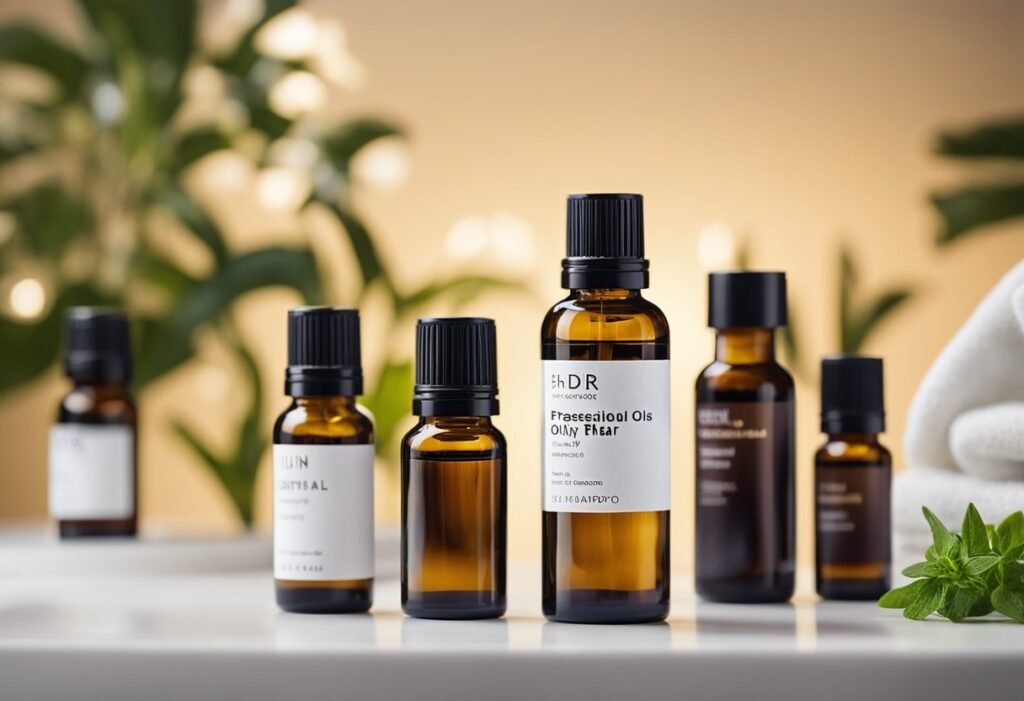
If you have tried using essential oils for oily hair and have not seen any improvement, it may be time to seek professional advice. A dermatologist or trichologist can help diagnose the underlying cause of your oily hair and recommend appropriate treatments.
It is also important to seek professional advice if you have any underlying medical conditions or are taking medication that may be contributing to your oily hair. Certain medical conditions, such as hormonal imbalances, can cause excess oil production in the scalp.
Additionally, if you experience any unusual symptoms such as excessive hair loss or scalp irritation, it is important to seek professional advice. These symptoms may be indicative of a more serious underlying condition that requires medical attention.
Overall, while essential oils can be a helpful addition to your hair care routine, it is important to seek professional advice if you have any concerns or are not seeing the desired results.
Frequently Asked Questions
What are the best essential oils for managing oily hair?
There are several essential oils that are beneficial for managing oily hair. Some of the best essential oils for oily hair include lemon, peppermint, tea tree, and rosemary oil. These oils help in reducing excess oil production in the scalp and promote healthy hair growth.
How can tea tree oil benefit an oily scalp?
Tea tree oil is an excellent natural remedy for an oily scalp as it has antifungal and antibacterial properties. It helps in reducing the production of excess oil in the scalp and prevents dandruff and other scalp infections. Tea tree oil also promotes healthy hair growth and adds shine to the hair.
Can rosemary oil help in reducing oiliness in hair?
Yes, rosemary oil is beneficial in reducing oiliness in hair. It helps in regulating the production of sebum in the scalp and prevents the buildup of excess oil. Rosemary oil also stimulates hair growth and improves the overall health of the hair.
What is an effective way to apply essential oils to oily hair?
The best way to apply essential oils to oily hair is to dilute them with a carrier oil such as coconut oil or jojoba oil. Mix a few drops of essential oil with a tablespoon of carrier oil and massage the mixture into the scalp. Leave it on for a few hours or overnight and then wash it off with a mild shampoo.
Which essential oil recipes are recommended for oily hair treatment?
Some of the essential oil recipes that are recommended for oily hair treatment include a mixture of lemon and peppermint oil, tea tree oil and lavender oil, and rosemary oil and jojoba oil. These recipes help in reducing excess oil production in the scalp and promote healthy hair growth.
Is it beneficial to use oils on the scalp for those with fine and oily hair?
Yes, it is beneficial to use oils on the scalp for those with fine and oily hair. However, it is important to choose the right type of oil and use it in moderation. Essential oils such as peppermint, tea tree, and rosemary oil are beneficial for those with fine and oily hair as they help in reducing excess oil production in the scalp and promote healthy hair growth.

